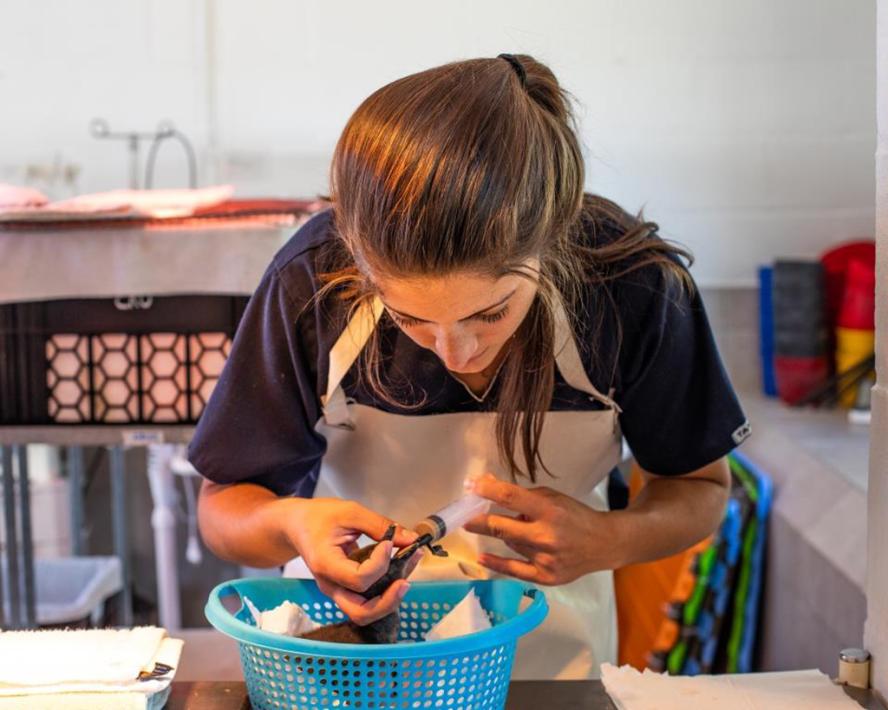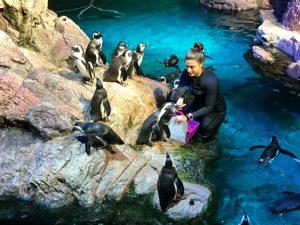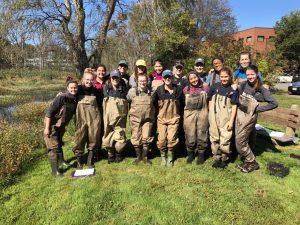-
About
- Leadership & Faculty
- News & Events
-
Academics
- Graduate
- Advanced Clinical Training
- Continuing Education
- Academic Departments
- Academic Offices
- Simulation Experiences
-
Student Life
- Offices
-
Research
-
Hospitals & Clinics
- Emergency Care
- Hospital Services
-
Community Outreach
- Volunteer
Adapting to Her Surroundings
Miren Schleicher, V18, pushes her boundaries to implement climate-change-based solutions for a global impact.

In early March 2020, just as the COVID-19 pandemic was beginning to unfold in the United States, Miren Schleicher, V18, boarded a plane to Cape Town, South Africa.
Her mission? To join C4 EcoSolutions as an intern on a team working to implement climate-change-adaptation solutions, both large and small, around the world
From a young age, Schleicher has been passionate about animals. But she also has been aware of the environmental changes significantly affecting wild species across the globe. As both that awareness and climate change continued to evolve, Schleicher knew she wanted a career that would allow her to have a direct, positive influence on the situation.
“It's such a pressing issue that I feel like it's difficult to consider working on anything else,” she says.
Schleicher accepted the position at C4 as no stranger to South Africa. Prior to moving there, she had been periodically visiting over the past five years to work with African Penguins through the Southern African Foundation for the Conservation of Coastal Birds, or SANCCOB.
When she wasn’t in South Africa, Schleicher worked at the New England Aquarium. She started at the Boston institution back in 2012, during her undergraduate degree cooperative through Northeastern University. “Working at the aquarium was a dream job for me,” she says, “but then working at SANCCOB showed me that I wanted to be out more in the conservation field.”
Inspired by her experiences abroad, in 2017, Schleicher enrolled in the Master of Science in Conservation Medicine (MCM) Program at Cummings School of Veterinary Medicine.
Through her work with SANCCOB, Schleicher had fallen in love with Cape Town, and she followed that connection to C4 after receiving her M.S. from Tufts. Today, although her current position represents a departure from all she’d done previously, Schleicher says, “it is really closely related to a lot of the work that we did as MCM students. I must reference the course materials from the MCM Program at least once a week.”
For example, when preparing for stakeholder consultations for a project in the Pacific Islands, Schleicher referred to materials from the MCM course in Project Management and Communication on how to engage with stakeholders. “It's been really invaluable to me,” she says.
She also largely attributes getting hired at C4 to skills she learned in the MCM Program’s Geographic Information Systems (GIS) course, for which she was the teaching assistant the year after graduation. GIS allows for the mapping, modeling, and analyzing of data about specific locations and provides current and historical information important to conservation efforts.
While much of her current work at C4 isn’t directly with wildlife, Schleicher still gets her seabird fix volunteering with SANCCOB on weekends. She also finds that many of her C4 projects are “poster children” for the One Health approach that’s so critical to conservation medicine.
“One project I’m working on is in Laos, where we’re trying some ecosystem-based adaptations to help with flooding there,” she says. “We are looking at how we can integrate natural vegetation to help mitigate these regular floods that they're seeing now.”
The floods that historically only happened once every 50 years or 100 years are now occurring every two or three years, Schleicher explains. By incorporating more vegetation into the lands, the C4 project is also helping to preserve resources and habitats for both people and animals.
Throughout her life, Schleicher has learned to follow the things she’s passionate about and carve out her own space. Her experience moving to South Africa and working outside her wheelhouse has been a lesson in pushing her beyond her comfort zone—and she’s excited about her prospects to effect real changes for wild species through a company like C4.
“If you care about conservation, then you have to care about the environment and climate change as well,” Schleicher says. “I don't need to have my name written in the stars. But when you put so much of yourself into your work, at the end of the day, it’s important to know that it goes a little bit further than just yourself.”

